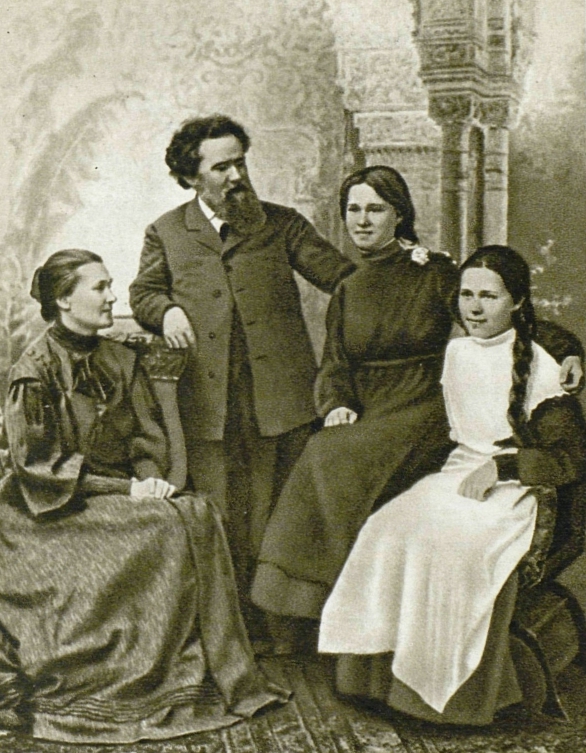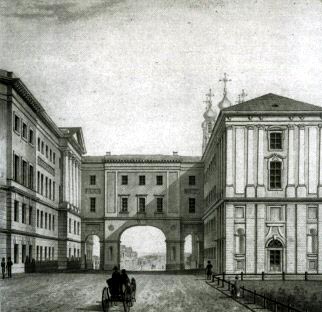|
A Nervous Breakdown
"A Nervous Breakdown" (russian: Припадок, translit=Pripadok) is an 1889 short story by Anton Chekhov. Publication The story first appeared in the charity compilation ''In the Memory of V.M. Garshin'' (Памяти В. М. Гаршина), published in Saint Petersburg in January of that year. In a revised version, it made its way into another collection, ''Gloomy People'' (Хмурые люди, Khmurye lyudi, 1890). With some further edits, Chekhov included it into Volume 5 of his Collected Works, published by Adolf Marks in 1899–1901. During its author's lifetime the story was translated into German, Serbo-Croatian and Swedish languages.Commentaries to Припадок Чехов А. П. Припадок // А. П. Полное собрание сочинений и писем: В 30 т. Соч ... [...More Info...] [...Related Items...] OR: [Wikipedia] [Google] [Baidu] |
Anton Chekhov
Anton Pavlovich Chekhov (; 29 January 1860 Old Style date 17 January. – 15 July 1904 Old Style date 2 July.) was a Russian playwright and short-story writer who is considered to be one of the greatest writers of all time. His career as a playwright produced four classics, and his best short stories are held in high esteem by writers and critics."Stories ... which are among the supreme achievements in prose narrative.Vodka miniatures, belching and angry cats George Steiner's review of ''The Undiscovered Chekhov'', in ''The Observer'', 13 May 2001. Retrieved 16 February 2007. Along with Henrik Ibsen and August Strindberg, Chekhov is often referred to as one of the three seminal figures in the birth of early modernism in the theatre. Chekhov was a physician by profession. "Medicine is my lawful wife", he once said, "and literature is my mistress." Chekhov renounced the theatre after the reception of ''The Seagull'' in 1896, but the play was revived to acclaim in 189 ... [...More Info...] [...Related Items...] OR: [Wikipedia] [Google] [Baidu] |
Severny Vestnik
''Severny Vestnik'' (russian: Се́верный ве́стник, en, The Northern Messenger) was an influential Russian literary magazine founded in Saint Petersburg in 1885 by Anna Yevreinova, who stayed with it until 1889. History In the early years ''Severny Vestnik'' was the Narodnik's stable; after ''Otechestvennye Zapiski'' folded in 1884 it was here that Nikolay Mikhaylovsky and his allies took refuge, among them being Gleb Uspensky, Vladimir Korolenko and Anton Chekhov. Later, in the 1890s, after Liubov Gurevich's group had acquired it, ''Severny Vestnik'' became the center of the Russian decadent movement with Dmitry Merezhkovsky, Zinaida Gippius, Konstantin Balmont and Fyodor Sologub as stalwarts. Mikhail Albov Mikhail Nilovich Albov (russian: Михаи́л Ни́лович А́льбов; November 20, 1851 – June 25, 1911) was a Russian writer. Biography Albov was born in St Petersburg in 1851. From an early age he showed a love for reading. He ... edite ... [...More Info...] [...Related Items...] OR: [Wikipedia] [Google] [Baidu] |
Short Stories By Anton Chekhov
Short may refer to: Places * Short (crater), a lunar impact crater on the near side of the Moon * Short, Mississippi, an unincorporated community * Short, Oklahoma, a census-designated place People * Short (surname) * List of people known as the Short Arts, entertainment, and media * Short film, a cinema format (also called film short or short subject) * Short story, prose generally readable in one sitting * ''The Short-Timers'', a 1979 semi-autobiographical novel by Gustav Hasford, about military short-timers in Vietnam Brands and enterprises * Short Brothers, a British aerospace company * Short Brothers of Sunderland, former English shipbuilder Computing and technology * Short circuit, an accidental connection between two nodes of an electrical circuit * Short integer, a computer datatype Finance * Short (finance), stock-trading position * Short snorter, a banknote signed by fellow travelers, common during World War II Foodstuffs * Short pastry, one which is rich in butt ... [...More Info...] [...Related Items...] OR: [Wikipedia] [Google] [Baidu] |
Alexander Skabichevsky
Alexander Mikhailovich Skabichevsky (russian: Алекса́ндр Миха́йлович Скабиче́вский, September 27 (o.s., 15), 1838, Saint Petersburg, Russian Empire – January 11, 1911, o.s., December 29, 1910) was a Russian literary historian, critic and memoirist, part of the Narodnik movement, best known for his series of biographies of the 19th century Russian writers. Biography Skabichevsky was born in Saint Petersburg into the family of a minor state official, the descendant of an old noble Ruthenian family. He studied first at the Larin gymnasium, then (in 1856-1861) at the Saint Petersburg University. After graduation, Skabichevsky went to work for a short while at the office of Saint Petersburg governor Prince Suvorov. 1864 saw him editing the stock market bulletin in Yaroslavl. For several years he worked as a teacher in different schools, including the Larin gymnasium. Career Skabichevsky debuted as a published author in 1859 with an article called ... [...More Info...] [...Related Items...] OR: [Wikipedia] [Google] [Baidu] |
Vladimir Korolenko
Vladimir Galaktionovich Korolenko (russian: Влади́мир Галактио́нович Короле́нко, ua, Володи́мир Галактіо́нович Короле́нко; 27 July 1853 – 25 December 1921) was a Ukrainian-born Russian writer, journalist, human rights activist and humanitarian of Ukrainian and Polish origin. His best-known work include the short novel '' The Blind Musician'' (1886), as well as numerous short stories based upon his experience of exile in Siberia. Korolenko was a strong critic of the Tsarist regime and in his final years of the Bolsheviks. Biography Early life Vladimir Korolenko was born in Zhytomyr, Ukraine (Volhynian Governorate), then part of the Russian Empire.Tyunkin, K.I. Foreword. The Works by V.G. Korolenko in 6 volumes. Pravda Publishers. Ogonyok Library. Moscow, 1971. Vol. 1, pp. 3-38 His Ukrainian Cossack father, Poltava-born Galaktion Afanasyevich Korolenko (1810-1868), was a district judge who, "amongst the people ... [...More Info...] [...Related Items...] OR: [Wikipedia] [Google] [Baidu] |
Saltykov-Shchedrin
Mikhail Yevgrafovich Saltykov-Shchedrin ( rus, Михаи́л Евгра́фович Салтыко́в-Щедри́н, p=mʲɪxɐˈil jɪvˈɡrafəvʲɪtɕ səltɨˈkof ɕːɪˈdrʲin; – ), born Mikhail Yevgrafovich Saltykov and known during his lifetime by the pen name Nikolai Shchedrin ( rus, Николай Щедрин), was a major Russian writer and satirist of the 19th century. He spent most of his life working as a civil servant in various capacities. After the death of poet Nikolay Nekrasov, he acted as editor of a Russian literary magazine ''Otechestvenniye Zapiski'' until the Tsarist government banned it in 1884. In his works Saltykov mastered both stark realism and satirical grotesque merged with fantasy. His most famous works, the family chronicle novel ''The Golovlyov Family'' (1880) and the political novel ''The History of a Town'' (1870) became important works of 19th-century fiction, and Saltykov is regarded as a major figure of Russian literary Realism. Bi ... [...More Info...] [...Related Items...] OR: [Wikipedia] [Google] [Baidu] |
Viktor Burenin
Viktor Petrovich Burenin (russian: Виктор Петрович Буренин, March 6 ebruary 22, o.s. 1841 in Moscow, Russian Empire – August 15, 1926 in Leningrad, Soviet Union) was a Russian literary and theatre critic, publicist, novelist, dramatist, translator and satirical poet notorious for his confrontational articles and satirical poems, mostly targeting leftist writers. He was the author of several popular plays (some co-authored by Alexey Suvorin), novels and opera librettos (Tchaikovsky's ''Mazepa''; Cui's ''Angelo''). Biography Viktor Burenin was born in Moscow, the twelfth child in the family of architect Pyotr Petrovich Burenin. As a student of the Moscow College of Architecture (1852-1859), he became friends with some amnestied Decembrists (Ivan Pushchin, Ivan Yakushkin, Gavriil Batenkov among others) who introduced the young man to the Russian literary circles. A strong influence proved to be petrashevets Sergey Durov who advised him to translate Bar ... [...More Info...] [...Related Items...] OR: [Wikipedia] [Google] [Baidu] |
Ivan Gorbunov-Posadov
Ivan Ivanovich Gorbunov-Posadov (russian: Иван Иванович Горбунов-Посадов, 16 ld style: 4April 1864 - 12 February 1940) was a Russian, Soviet writer, poet, editor and publisher.Biography at the Literary Encyclopedia. 1929. Vol.2, pp.634-635 // Горбунов-Посадов // Литературная энциклопедия: В 11 т. - �. 1929-1939. Т. 2. - �. Изд-во Ком. Акад., 1929. -- Стб. 634--635 An avid since 1884, Gorbunov-Posadov often served as an intermediary between |
Alexey Suvorin
Aleksei Sergeyevich Suvorin (Russian: Алексей Сергеевич Суворин, 11 September 1834, Korshevo, Voronezh Governorate – 11 August 1912, Tsarskoye Selo) was a Russian newspaper and book publisher and journalist whose publishing empire wielded considerable influence during the last decades of the Russian Empire. He set out as a liberal journalist but, like many of his contemporaries, he experienced a dramatic shift in views, gradually drifting towards nationalism. Early career Suvorin was a quintessential selfmade man. Born of a peasant family, he succeeded in gaining access to a military school at Voronezh from which he graduated in 1850. In the following year, he arrived in St. Petersburg and joined a major artillery school there. With limited prospects of pursuing a military career, he spent eight years in his native haunts, teaching history and geography, first in Bobrov and then in Voronezh. No one could have predicted that within two or three dec ... [...More Info...] [...Related Items...] OR: [Wikipedia] [Google] [Baidu] |
Yaroshenko Plescheev
Yaroshenko (Ukrainian: Ярошенко, also spelled Yarochenko or Iarochenko) is a Ukrainian last name. It is derived from the Ukrainian first name Yarosh. People * Nikolay Yaroshenko (born 1986), Russian triathlete * Dmitri Yaroshenko (born 1976), Russian biathlete * Igor Yaroshenko (born 1967), Soviet–Ukrainian ice dancer * Kostyantyn Yaroshenko (born 1986), Ukrainian footballer * Nikolai Yaroshenko (1846–1898), Ukrainian painter * Semen Yaroshenko (1846–1917), mathematician and mayor of Odessa * Sergey Yaroshenko (born 1977), Ukrainian tennis player * Valery Yaroshenko (born 1997), Russian footballer * Yuriy Yaroshenko Yuriy Yaroshenko ( uk, Юрій Миколайович Ярошенко; born 5 January 1961, in Frunze (today Bishkek), Kyrgyz SSR) is a former Soviet and Ukrainian footballer and Ukrainian football coach. He has a son Kostyantyn Yaroshenko who ... (born 1961), Soviet-Ukrainian footballer, father of Kostyantyn See also * * Yeroshenko {{surname ... [...More Info...] [...Related Items...] OR: [Wikipedia] [Google] [Baidu] |
Alexey Pleshcheyev
Aleksey Nikolayevich Pleshcheyev (russian: link=no, Алексе́й Никола́евич Плеще́ев; 8 October 1893) was a radical Russian poetry, Russian poet of the 19th century, once a member of the Petrashevsky Circle. Pleshcheyev's first book of poetry, published in 1846, made him famous: "Step forward! Without fear or doubt..." became widely known as "a Russian ''La Marseillaise''" (and was sung as such, using French melody), "Friends' calling..." and "We're brothers by the way we feel..." were also adopted by the mid-1840s' Russian radical youth as revolutionary hymns. In 1849, as a member of Petrashevsky Circle, Pleshcheyev was arrested, sent (alongside Fyodor Dostoyevsky among others) to Saint Petersburg and spent 8 months in Peter and Paul Fortress. Having initially been given a death sentence, Pleshcheyev was then deported to Uralsk, near Orenburg where he spent ten years in exile, serving first as a soldier, later as a junior officer. In his latter life, Pl ... [...More Info...] [...Related Items...] OR: [Wikipedia] [Google] [Baidu] |
Kazimir Barantsevich
Kazimir Stanislavovich Barantsevich (russian: Казимир Станиславович Баранцевич, 3 June 1851, — 26 July 1927) was a Russian writer and poet, who also used the pseudonym Sarmat.Баранцевич, Казимир Станиславович at the Brockhaus and Efron Encyclopedic Dictionary Biography Barantsevich was born in to Stanislav Martynovich Barantsevich, a descendant of the Polish aristocratic family belonging to the Order of Leliwa, and his French wife Julia Ivanovna, Lemann.[...More Info...] [...Related Items...] OR: [Wikipedia] [Google] [Baidu] |




